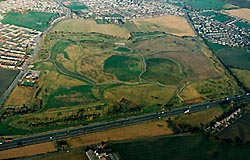 Project aims
Project aimsLaunched by the Deputy Prime Minister in July 2003, this £59 million project aims to reclaim large areas of derelict, under-used and neglected land across North-West England, transforming them into thriving community woodlands and significantly increasing woodland cover in the region.
Phase 1 – reclaiming 435 hectares of derelict, brownfield land
The first five-year phase will reclaim land throughout the Mersey Belt area for community woodland uses and economic growth. Areas targeted by Phase 1 include Greater Manchester, Cheshire and Merseyside.
Phase 2 encompasses Cumbria and Lancashire.
All Newlands sites were selected from a database of derelict, underused or neglected (DUN) land, produced by an analysis of aerial photographs, the National Land Use Database (NLUD) and Unitary Development Plans.
This initial study identified 3800 sites of more than 1 ha, of which 1600 were previously developed brownfield sites deemed potentially suitable for woodland planting under the Newlands scheme.
These sites were then prioritised according to the results of a Public Benefits Recording System assessment. This methodology was designed to measure the public benefit that could be delivered through the regeneration of each site, and includes assessments of social, economic, environmental and accessibility benefits.
Newlands received a significant amount of funding from the Northwest Regional Development Agency (NWDA), and is being delivered in partnership with the Forestry Commission, as well as a number of delivery partners including:
Various local authorities in the area are also involved along with several major landowners such as United Utilities and Greater Manchester Waste Disposal Authority.